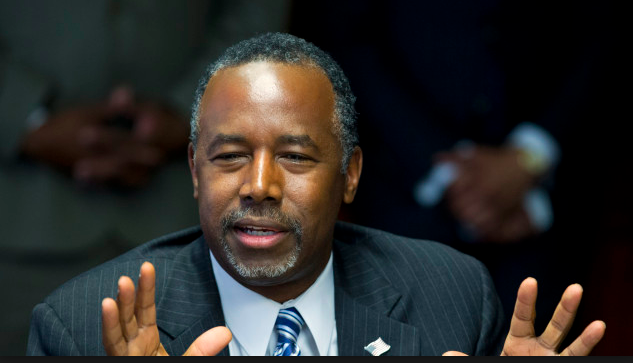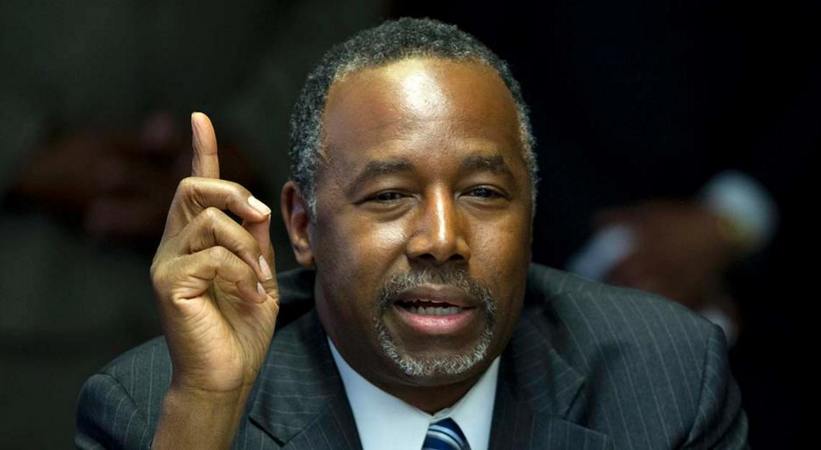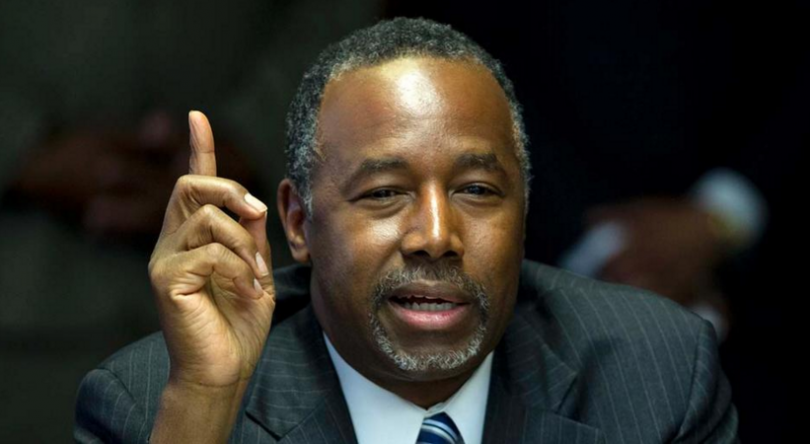 aNewDomain — As a leftist, it makes me feel exceedingly uncomfortable to call the only major black presidential candidate stupid. It’s especially strange to be so certain that he’s a dumbass, given that he’s a brain surgeon.
aNewDomain — As a leftist, it makes me feel exceedingly uncomfortable to call the only major black presidential candidate stupid. It’s especially strange to be so certain that he’s a dumbass, given that he’s a brain surgeon.
But there it is. It’s true, and it needs to be said.
Ben Carson is stupid.
For the media, it’s the gaffes. Declaring that the Affordable Care Act is somehow akin to slavery. Claiming that the Holocaust would have been less Holocausty if the Jews had come out of their hidey holes with, as The Clash song had it, their fingers on the triggers of their guns.
Not for me. I see the dead look in Ben’s eyes. I hear his voice — as Donald Trump says, it exudes low energy. Stoned, some say. Half-dead, I think.
More than anything else, it’s Carson’s answers to reporters’ questions. He takes too long to reply. When he (finally) does, it’s always — always — something dumb.
Here’s an exercise. Right now, on Monday at 11:35 a.m. Eastern time, I’m going to Google Ben Carson and find the first answer in the first article that comes up with an answer. Here it is, from CNN.com:
As a teenager, I would go after people with rocks, and bricks, and baseball bats, and hammers. And, of course, many people know the story when I was 14 and I tried to stab someone.”
Wow.
What?
I’m not sure I want a president inept at something as simple as stabbing. How hard is stabbing, anyway? Take knife. Aim tip at victim’s skin. Plunge. If Carson can’t even stab right, how is he going to drone?
 Pundits don’t get the appeal of Donald Trump, but I do: He’s loud and outrageous and brash and apparently has enough money that he doesn’t have to care what anyone thinks, or follow a rigid party line or win the presidency. He has everything to win, and just one thing to lose — and he’s cool either way.
Pundits don’t get the appeal of Donald Trump, but I do: He’s loud and outrageous and brash and apparently has enough money that he doesn’t have to care what anyone thinks, or follow a rigid party line or win the presidency. He has everything to win, and just one thing to lose — and he’s cool either way.
What I don’t understand is the appeal of Ben Carson. Trump and I are on the same page: “I don’t know what the hell is going on there,” Trump told a rally after hearing that Carson had passed him in the Iowa caucuses polls. “I don’t get it!”
Trip Gabriel tries to answer the why-Carson question in today’s New York Times.
It’s the stonediness.
“That smile and his soft voice makes people very comforted,” the Times quoted Miriam Greenfield, a farmer in Jewell, Iowa.
“I believe someone as mild-mannered and gentlemanly as Ben Carson is just about the only kind of person that could [change the partisan bickering in Washington],” said Jason Walke, a trial lawyer in Des Moines.
“His supporters cite Mr. Carson’s character, not his positions, as the main reason they back him. And they say his low-key approach is precisely what would tame Washington’s bitter partisanship, rather than Mr. Trump’s swagger,” Gabriel writes.
Trump is rough; Carson is reassuring,” Peter D. Hart, a pollster who led a recent GOP focus group, concluded. “And the unknown elements of Carson are calming, and the known elements of Trump are disturbing.”
Focus groupers called Carson “wise” and a “gentleman.”
Wise, yeah, no.
Carsonmania reminds me of a study that confirmed something that ought to strike fear into the hearts of political consultants: Voters cast their ballots based on vague impressions. Issues, framing, advertising — that crap matters not at all, or barely.
From Princeton magazine (long quote because it’s fascinating):
Princeton psychologist Alexander Todorov has demonstrated that quick facial judgments can accurately predict real-world election returns. Todorov has taken some of his previous research that showed that people unconsciously judge the competence of an unfamiliar face within a tenth of a second, and he has moved it to the political arena. His lab tests show that a rapid appraisal of the relative competence of two candidates’ faces was sufficient to predict the winner in about 70 percent of the races for U.S. senator and state governor in the 2006 elections.”
“We never told our test subjects they were looking at candidates for political office — we only asked them to make a gut reaction response as to which unfamiliar face appeared more competent,” said Todorov, an assistant professor of psychology and public affairs. “The findings suggest that fast, unreflective judgments based on a candidate’s face can affect voting decisions.”
 Todorov and Charles Ballew, an undergraduate psychology major who graduated from Princeton in 2006, conducted three experiments in which several dozen participants had to make snap judgments about faces. Participants were shown a series of photos, each containing a pair of faces, and asked to choose, based purely on gut feeling, which face they felt displayed more competence.
Todorov and Charles Ballew, an undergraduate psychology major who graduated from Princeton in 2006, conducted three experiments in which several dozen participants had to make snap judgments about faces. Participants were shown a series of photos, each containing a pair of faces, and asked to choose, based purely on gut feeling, which face they felt displayed more competence.
The differences among the experiments largely concerned the amounts of time an observer was allowed to view the faces – as brief as a tenth of a second or longer — and to pass judgment afterward.
What was unknown to the participants in the third experiment was that the image pairs were actually the photographs of the two frontrunner candidates for a major election being held somewhere in the United States during the time of the experiment in late 2006. The races were either for state governor or for a seat in the U.S. Senate. In cases where an observer recognized either of the two faces, the researchers removed the selection from the data.
Two weeks later elections were held, and the researchers compared the competency judgments with the election results. They found that the judgments predicted the winners in 72.4 percent of the senatorial races and 68.6 percent of the gubernatorial races.
The two parties spent $7 billion on the 2012 presidential race. Why not just skip these expensive and time-consuming elections, shoot headshots of the candidates’ faces to the electorate for a second or two, and be done with it?
Which brings us back to Ben Carson. Put Carson’s face next to Trump’s, and even Republicans — who are more racist than Democrats — are likely to choose the amiable black man over the predatory orange-haired one.
It makes perfect sense — until Carson starts talking.
For aNewDomain and the new SkewedNews, I’m Ted Rall.
Cover image: DeadState.org, All Rights Reserved; inset image: TalkingPointsMemo.com, All Rights Reserved.













